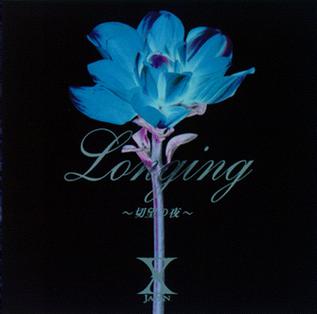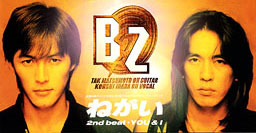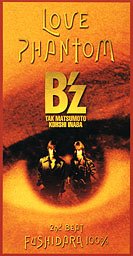
B'z are a Japanese rock duo, consisting of guitarist, composer and producer Takahiro "Tak" Matsumoto and vocalist and lyricist Koshi Inaba, known for their energetic hard rock tracks and pop rock ballads. B'z is one of the best-selling music artists in the world and the best-selling in their native Japan, having released 49 consecutive No. 1 singles, 25 No. 1 albums, 3 No. 1 EPs on the Oricon music charts and sold more than 100 million records worldwide.

Utada Hikaru, who is also known as Hikaru Utada and the mononym Utada, is a Japanese-American singer-songwriter and producer. Born in the United States to Japanese parents, record producer Utada Teruzane and enka singer Keiko Fuji, Utada began to write music and lyrics at an early age and often traveled to Tokyo as a result of Teruzane's job. Eventually, a recording contract with Toshiba-EMI was signed and, under the stage name Cubic U, Utada released an English-language debut album Precious in early 1998, but it was a commercial failure. In the following year, heavily influenced by R&B and dance-pop, a Japanese-language debut First Love was released and became an immediate success. Backed by the success of singles "Automatic", "Time Will Tell", and "Movin' On Without You", the album sold two million copies in its first week in Japan, topped the Oricon charts for six non-consecutive weeks and went on to sell six million more throughout the rest of 1999. First Love eventually became the country's best-selling album of all time.

Kwon Bo-ah, known professionally as BoA, is a South Korean singer, songwriter, dancer, record producer and actress. BoA has been recognized as one of the most successful and influential Korean entertainers throughout her career, and is therefore commonly credited as the "Queen of K-pop."
J-pop, natively also known simply as pops, is a musical genre that entered the musical mainstream of Japan in the 1990s. Modern J-pop has its roots in traditional Japanese music, but significantly in 1960s pop and rock music, such as The Beatles and The Beach Boys, which led to Japanese rock bands such as Happy End fusing rock with Japanese music in the early 1970s. J-pop was further defined by new wave and crossover fusion acts of the late 1970s such as Yellow Magic Orchestra and Southern All Stars, then Eurobeat in the early 1990s, namely Namie Amuro.

Mai Kuraki is a Japanese pop and R&B singer-songwriter and record producer. After releasing her US debut single "Baby I Like" in 1999, Kuraki signed with Giza Studio and released her Japanese debut single "Love, Day After Tomorrow" in 1999. In 2000, she released her debut album, Delicious Way, which debuted at number-one and sold over 2.2 million copies in its first week. The album has spawned four top-three singles, "Love, Day After Tomorrow", "Stay by My Side", "Secret of My Heart", and "Never Gonna Give You Up". Eventually, the album sold over 3.5 million copies nationwide and became the best-selling album in Japan in 2000, and has been the ninth best-selling album in Japan of all-time.
Southern All Stars, also known by the abbreviations Sazan (サザン) and SAS, are a Japanese rock band that first formed in 1974.

First Love is the debut Japanese-language studio album by Japanese-American recording artist Utada Hikaru, released on 10 March 1999 on Toshiba-EMI.
Toshinobu "Toshi" Kubota is a Japanese singer, songwriter, musician, music producer, and radio personality. He has produced six million-seller records and thirty-three Top 40 singles during his career. Kubota is currently part of Sony Music Japan. In addition, he has composed and written songs for many singers including Hiromi Iwasaki, Misia, Toshinori Yonekura, Kyōko Koizumi, and many other recording artists.

Yui, stylized as YUI or yui, is a Japanese singer-songwriter, multi-instrumentalist, and actress. In her solo career, she sold more than 5 million physical copies in Japan. She is popular in Japan and in surrounding countries, ranking number one in 2011 Count Down TV "Dearest Female Artist" and Music Station "Artist You Most Want to Marry" polls, as well as Radio Television Hong Kong's "Most Popular Japanese Artist".

"Longing" is a ballad by Japanese heavy metal band X Japan and written by Yoshiki. The song has been released in several versions, most notably in two different single variations. The first, "Longing ~Togireta Melody~", was released as their eleventh single on August 1, 1995 and reached the number 1 spot on the Oricon chart. The second, "Longing ~Setsubou no Yoru~", is their twelfth released on December 11, 1995 and reached number 5.
KinKi Kids is a Japanese duo consisting of Koichi Domoto and Tsuyoshi Domoto under the talent agency Johnny & Associates. Although the members share the same surname, the only relation they have to each other is that they both hail from the Kinki region, hence the duo's name. KinKi Kids was formed in 1993 and officially debuted on July 21, 1997.

B'z The Best "Pleasure" is the third compilation album by the Japanese rock duo B'z and released in 1998. It includes many of the group's hit singles from 1989 to 1998. With the exception of "Be There", all the songs are #1 hits on the Oricon charts.
Japanese rock duo B'z has released twenty-one studio albums, twelve compilation albums, eight extended plays (EP), fifty-seven singles and nineteen live albums. With more than 82 million sales in Japan, the duo is the best-selling artist in Japan and with 100 million sales one of the best-selling music artists of all time.

Ai no mama ni Wagamama ni Boku wa Kimi dake wo Kizutsukenai is a song by B'z, released as their twelfth single, on March 17, 1993. This song is one of B'z many number one singles in Oricon chart. The single was re-released in 2003, and re-entered at #5. The single sold over two-million copies according to Oricon. According to Oricon, the song was their best-selling single in Japan. The song won "the best five single award" at the 8th Japan Gold Disc Award. It was released in the best-of album B'z The Best "Pleasure".

Negai is the sixteenth single by B'z, released on May 31, 1995. This song is one of B'z many number-one singles in Oricon chart. It sold over 1,498,000 copies according to Oricon.

"Love Phantom" is the eighteenth single by B'z, released on October 11, 1995. This song is one of B'z many number-one singles in Oricon chart. The song was used as ending theme for The X-Files during the height of its popularity in Japan. The single sold over 950,000 copies within one week. It sold over 1,862,000 copies according to Oricon. The song won "the best five single award" at the 10th Japan Gold Disc Award.
Thelma Aoyama is a Japanese pop and R&B singer. She is part Afro-Trinidadian and Japanese.
The discography of Japanese R&B singer Toshinobu Kubota consists of nineteen studio albums, ten compilation albums, two tribute albums, and over seventy singles. In 1985, Kubota signed with Sony Japan and began producing and writing songs for many of label's singers and groups. Under the label, Kubota released his first single, "Shitsui no Downtown" in June 1986, followed by "Time Shower ni Utarete" in December. Both songs were well received by radio, placing fifty-three and thirty-five on the Oricon Singles Chart. In September 1986, his debut album, Shake It Paradise, peaked at number twenty-two and remained on the Oricon Albums Chart for seven consecutive weeks. Shake It Paradise became certified million. The following year in 1987, Kubota's second studio album, Groovin', debuted at number thirty-three and was certified million. In February 1988, Kubota released "You Were Mine", which debuted at number two. In September 1988, Kubota released his third album, Such A Funky Thang!. The album peaked at number one and was certified million. The album also spawned the top-charted single "Dance If You Want It", which peaked at number three. In 1989, Kubota released his compilation album, The Baddest. The album also peaked at number one and was certified million.
Japanese singer-songwriter Mai Kuraki has released twenty-five video albums and three video singles, and been featured in sixty-six music videos, two television series, and eleven commercials. Kuraki debuted in 1999, while she was still in high school, through Giza Studio. The label initially marketed Kuraki in the United States under the name Mai K, and released the single "Baby I Like" (1999). However, the single was a commercial failure which prompted the label to send her back to Japan. There, they released her single "Love, Day After Tomorrow", which peaked at number two on the Oricon Singles Chart and was certified million by the Recording Industry Association of America (RIAJ). The second single, "Stay by My Side" became her first number one single on the chart. Kuraki's debut album, Delicious Way, topped the Oricon Albums Chart and was certified triple million by the RIAJ.

The singles discography of South Korean girl group Twice consists of twenty-nine singles and nine promotional singles.












